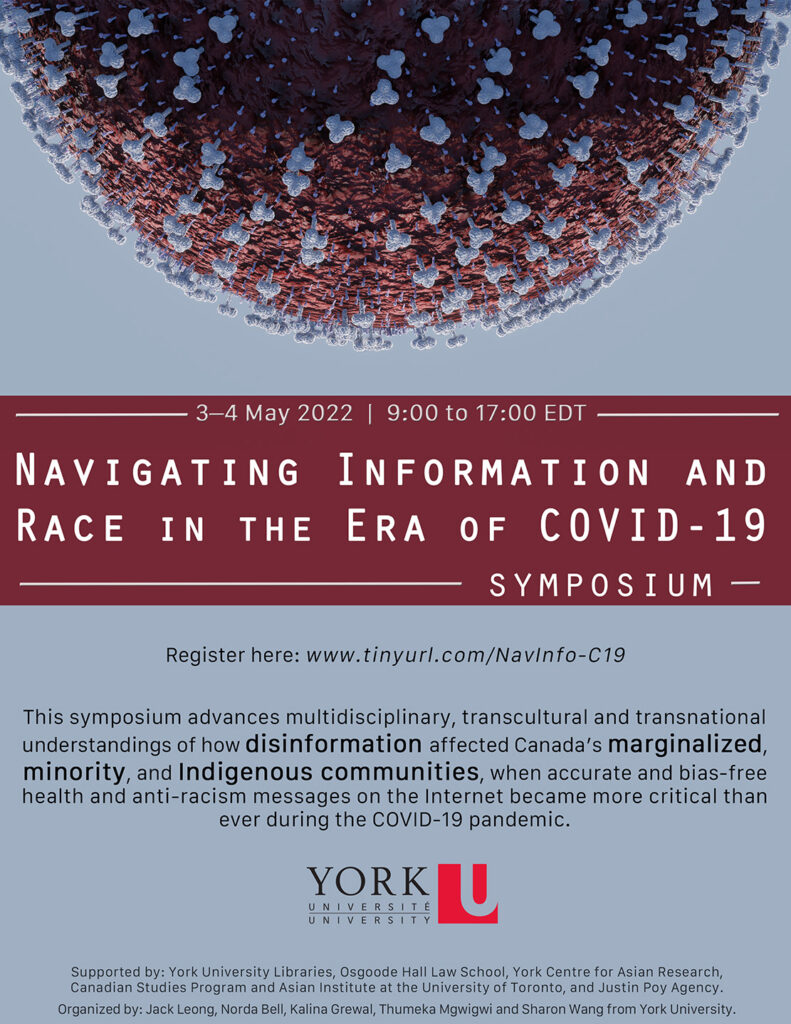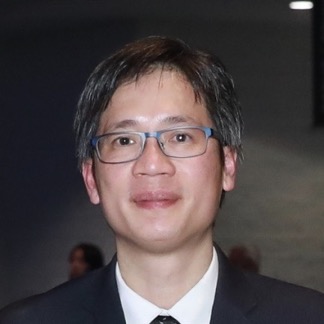At a time when COVID-19 continues to impact various communities, accurate and bias-free health and anti-racism messages on the web have also become more critical than ever during the COVID-19 pandemic. Data also show that the virus’-impact has been highly racialized.
On May 3-4, 2022, YorkU Libraries will host a virtual symposium on Navigating Information and Race in the Era of COVID-19 to help advance multidisciplinary, transcultural and transnational understandings of how disinformation affects Canada’s vulnerable groups, including marginalized, minority, and indigenous communities.
This research symposium aims to investigate information navigation and the state of digital access to information across various axes of difference, such as gender, race, ethnicity, nationality, religion, philosophy, history, literature, migration, marketplace and diasporas -- each taken as unstable categories of information production, mediation and reception in the multicultural Canadian context.
Key areas that will be discussed include:
- social, cultural and digital identities in critical pedagogy
- effects of cultural encounters on misinformation or disinformation in the multicultural Canadian context; cultural hybridity captured in mainstream media and social media
- impact of misinformation or disinformation on marginalized, minority and indigenous communities
- critiques of multiculturalist ideology and policies that affect vulnerable communities
- patterns of information and disinformation consumption in Canadian immigrant communities; Anti-racism and subversive strategies in the narratives of Canadian history
- issues of alienation, integration, resistance and belonging in the process of information production, mediation and reception
This symposium consists of featured papers, panel presentations, roundtable discussion, an open forum and a focus group meeting to discuss the conclusions and recommendations for future direction. Delivered both in-person and online, the participants include senior scholars, emerging academics, graduate and undergraduate students, as well as community and business leaders whose work leads them to focus on cross-cultural encounters, information movements across borders, processes of displacement and historical change. In addition to Toronto-based participants, presenters and audience will also come to the symposium nationally and globally through virtual conferencing technology.
Jack Leong, Associate Dean at York University Libraries, has conducted research on the Chinese community and the impact of nomenclature of the COVID-19 virus and will present his findings at the symposium on May 3-4. He shares his insights on the goals of the symposium, his research and why York U Libraries is hosting this event.
- What compelled you to organize a symposium around this specific topic at this point in time?
There was a call for the SSHRC Digital Citizen Research Connection Grant centered around research on the impact of online disinformation in Canada. Information is central to the Libraries’ mission and vision of an informed, just, and democratic citizenry. Accessing accurate and bias-free health and anti-racism messages on the Internet became more critical than ever during the COVID-19 pandemic. We felt that that Libraries could offer a neutral space to facilitate research and engage in dialogue about misinformation, racism and COVID-19 from multidisciplinary and interdisciplinary perspectives.
- You’re speaking at the symposium about the naming of the virus and how that has impacted specific communities, can you tell us about your research in this area and how this is affecting these communities?
Chinese Canadians have settled in Canada as early as 1788. The first large scale of Chinese immigrants came to Canada during the Fraser River Gold Rush in the 1850s, followed by waves of Chinese railroad workers in the end of the 19th century. Most Chinese Canadians have changed their sojourner mentality to calling Canada home from the 1960s, the latest documented by researchers. While most Chinese Canadians see themselves as Canadians, but are they seen as such? The COVID-19 pandemic has once again taken this notion into the spotlight. From anti-Asian racism, naming of the virus, and contesting Chinese Canadians as simply Chinese, the pandemic highlights the subtle, unconscious, and systemic discrimination against Chinese Canadians. In my research, I discuss various names used to refer to the COVID-19 virus, specifically the ones related to ethnicity and origins, and reveal the anti-Chinese racism associated with these terms. I argue that these terminologies, most often claimed to have been derived out of convenience or common sense, denote deep rooted racist classification and what Michel Foucault calls “dividing practices” arrived from the binary system. In naming the virus as “other”, the dominant subjects/mainstream media/society divide themselves inside, in this case the Chinese Canadians from Canadians, or divide from others, the Chinese. The process reinforces and re-legitimizes the dominant group as subjects and in power.
- Why was it important to make this event a multidisciplinary one that brings so many voices together in the same event?
The topic of the symposium and the themes of navigating information and race are multidisciplinary in nature. They have been discussed and researched in many different disciplinary areas and the COVID-19 pandemic makes this approach more important than ever to achieve more balanced and holistic studies and responses to the current and future pandemics by bringing humanists, scientists, social scientists, journalists and the general public together. We bring in a plurality of voices to address the following questions:
What are the reasons for the spread of misinformation and mistrust about and among BIPOC communities? How do we address community safety in this environment? What are the effects of language and cultural encounters on racism in the multicultural Canadian context? What do the patterns of systematic discrimination and inequality of access to information look like during the pandemic? What are the negative impacts and abuses among vulnerable communities and how do we address them? What are the roles of the media on the spread of mis/disinformation and how they incorporate the values of equity, diversity and inclusion in terms of access to information and health resources during and beyond the pandemic?
- Tell us about some of the unique voices outside of York University that are speaking on the panels, what perspectives do they bring?
In addition to scholars from the West Coast who provide their national perspective, we are also featuring two roundtables organized by community leaders to hear unique voices beyond academia.
In the first roundtable, moderated by Mr. Justin Poy, the panelists will explore the role of social media, news media, and fake news during the pandemic, and its effect on diasporic communities in Canada. Discussions will center on the media representation of Canadians of Asian-descent, migrant workers, newcomers and other racialized communities. How do we as a research community counteract or combat online disinformation targeting racialized and vulnerable groups? The roundtable will generate possible steps or actions to address this question. The roundtable participants include Mr. Bill Hutchison from CTV News, Ms. Leslie Yip from Sing Tao Radio and Elit Gen Magazine, Mr. Joseph Tsang from FairChild Radio, Ishan Gosh from South Asian Media and Advertising and Ms. Olivia Chow from Toronto Metropolitan University.
The second roundtable features leaders from the Black and Asian-Canadian community, including Teresa Woo-Paw, former Member of the Legislative Assembly of Alberta, Gwendolyn Yip, University Ambassador, The University of British Columbia, Cheryl Prescod, Executive Director, Black Creek Community Health Centre, Amy Go, President, Chinese Canadian National Council for Social Justice
Kevin Huang, Co-Founder & Executive Director, Hua Foundation and Winnie Cheung, Co-Founder, Pacific Canada Heritage Centre - Museum of Migration Society.
We will facilitate a conversation about the lived experiences of Black and Asian-Canadians during the pandemic. Incidents of racism and discrimination both large and small faced by community members – in schools, neighbourhoods, and other settings - will be the focus. What actions can individuals or communities take to support or serve as allies to Black and Asian-Canadians? The roundtable will generate possible steps or actions to address this question.
- The symposium aims to advance understanding of how disinformation affects Canada’s vulnerable groups, including marginalized, minority, and indigenous communities. Given York University Libraries is organizing this event, what role do York’s libraries play in this area? Why are libraries important?
Libraries is best positioned to organize this symposium as it brings together scholars and community members from different faculties and backgrounds that reflect larger debates about misinformation, racism and COVID-19 in the multicultural Canadian society and the specific BIPOC communities’ experience. Libraries have always been a hub for gathering, preserving, and providing opportunities to interact and create new knowledge on emerging topics that require innovative and collaborative approaches. In particular, the libraries, with expertise and collections in diverse areas, provide the necessary social networks and intellectual connections to examine information and racial biases against various axes of difference, such as gender, ethnicity, nationality, religion, history, migration, media and diasporas – each taken as critical arenas in understanding how disinformation affects Canada’s vulnerable groups, including marginalized, minority, and indigenous communities.
- Who should attend this event?
The main audience of this research symposium is an academic one, including established scholars, emerging academics, graduate and undergraduate students. A secondary audience for the event will be found outside of the academy. In particular, representatives of the community and business sectors will be invited, especially those who are specialists in media, ethnic community business, cross-cultural encounters, information movements across sectors, processes of displacement and racial historical change. In addition to Toronto-based participants, the presenters and audience will also attend the symposium nationally and globally through virtual conferencing technology.
- Where will the research presented at this event be published?
After the symposium, the revised presentation papers will be collected for the publication of an edited volume. We plan to submit the publication proposal to an academic press, and if funding allows, it will be published as an open access resource.
- What are the goals of this event?
We hope to gather and generate new teaching and research materials in race and information studies, multiculturalism in Canada and digital media studies in relation to the topics of migration, ethnicity studies, cultural studies, history, Asian Canadian and Canadian studies. The research generated and shared through this project will also enrich Canadian public discourse, especially as it relates to heritage, digital citizenship, immigrant settlement and vulnerable communities.
To register visit: www.tinyurl.com/Navinfo-C19


